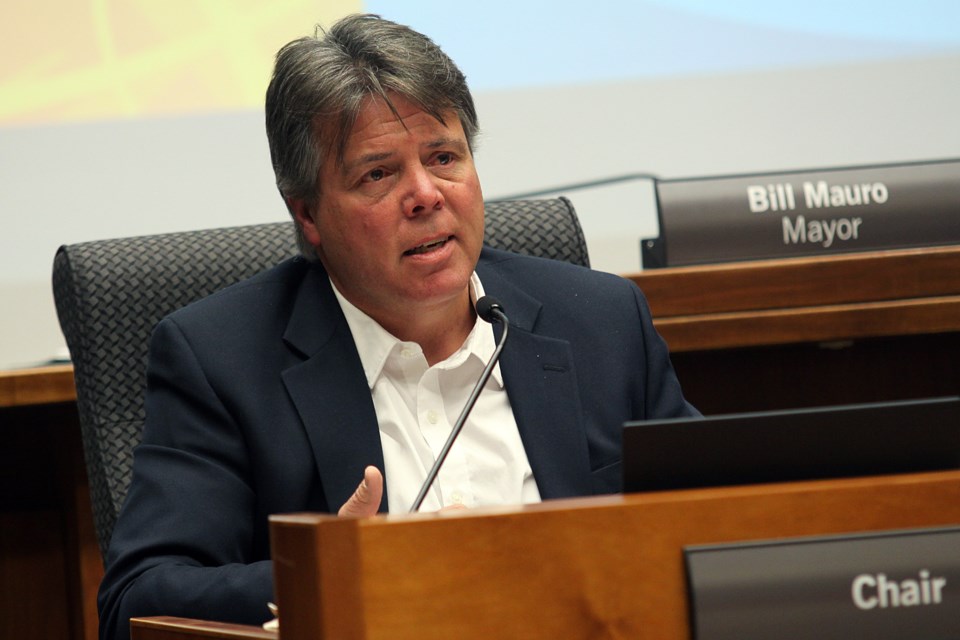THUNDER BAY – There’s no denying the significant financial challenges ahead for the City of Thunder Bay, but members of city council differed on just how existential those are as it kicked off the 2021 budget process Tuesday.
On the first of seven scheduled nights of meetings to set the municipal budget, councillors received a long-term budget overview from city staff. The document compared key metrics with other Ontario cities, and set out projections for the coming five years.
Administration drew praise for meeting council’s directive to draft a proposed 2021 budget with a tax levy increase no higher than two per cent, after growth.
However, staff projected the city will need to hike the levy by well over three per cent every year from 2022 to 2024 to contain rising costs.
Coun. Mark Bentz called those projections unacceptable, fearing the years ahead could be lean for many residents, given the lingering impact of the COVID-19 pandemic.
“I wouldn’t support a 3.5 per cent tax increase next year, nor the year after that if I happen to be on council,” he said. “So what does that mean for administration? It means you have to find millions of dollars [a year], if we’re going to come in at two per cent.”
Mayor Bill Mauro was far more optimistic, saying the future projections were a “starting point” only, and pointing out council had been presented with higher projections over the past decade.
“I want the community to appreciate we’re in relatively good shape,” he said, especially considering the budget came amid the COVID-19 crisis. “I think the book we have in front of us is a great start, and I think as a council we should feel great about this.”
The proposed budget’s two per cent tax levy increase (after growth) comes in below the city’s 10-year average of 2.35 per cent. Approved increases have ranged from 1.69 per cent (2014) to 3.21 per cent (2012) in that time.
The budget also includes a significant net five per cent increase to capital spending, as the city looks to slowly but surely address its looming infrastructure gap.
City administration compared Thunder Bay to other municipalities across Ontario on several key metrics.
The amount of municipal taxes paid by a Thunder Bay household, on average, on a single-family bungalow is $3,885. That’s above the Ontario average of $3,549, but below the average for municipalities of over 100,000 people ($4,201).
Similarly, the municipal taxes paid by Thunder Bay residents, as a percentage of their household income, sits just slightly higher than the Ontario average, and slightly below the average for cities of over 100,000.
The city’s industrial and commercial tax rates per square foot are also higher than average.
Administration pointed to compensating factors such as affordability, with the media value of a dwelling in Thunder Bay sitting below $230,000, according to the 2020 BMA municipal study.
That’s 2.5 times the average household income in the city, compared to the Ontario average of 3.4.
Residential tax payers continue to take on a larger part of the burden of funding city operations, as industrial assessment declines. Non-residential tax payers kicked in 38.7 per cent of the city’s tax levy in 2020, down from nearly five per cent from a decade earlier.
Some factors driving cost increases in 2021 include increased capital spending, a rise in insurance premiums and benefits for workers, and a substantial projected increase of nearly $800,000 to WSIB claims at Superior North EMS alone.
City manager Norm Gale warned the pandemic would spur similar increases across many city departments.
“We’re gearing up for significant costs,” he said. “We’re doing our best to mitigate them, but also to provide support to paramedics, other first responders, and others in high-risk areas like Pioneer Ridge, transit, and the like.”
Coun. Mark Bentz saw systemic challenges in the long-term overview’s five-year projections, particularly in an uncertain, likely low-growth post-pandemic period.
The document tentatively anticipates tax levy hikes, after growth, of 3.47 in 2022, 3.48 in 2023, and 3.31 in 2024, falling below the three per cent mark only the following year. Those numbers are based on projections growth will rebound slightly, something Bentz called uncertain.
“That’s a 13 per cent increase, compounded over four years – and these could be a very difficult four years for a lot of people,” he said. “Many of us around the table won’t bat an eye at those increases, quite honestly. But there are a lot of people in our community that will.”
Council should seek to hold tax increases to around the rate of inflation, he said.
That goal is more challenging than it might appear, Gale said, given the city’s base costs increase more quickly.
“To maintain status quo for the municipality – for us to just do the same thing year after year – means [the tax levy increase] needs to be above inflation,” he said. “Our basket of goods is not the same as the basket of goods a typical consumer pays.”
The city will face additional estimated costs over the coming years: changes in provincial health unit funding ($1.2 million a year beginning in 2022), increased debt payments ($2 million a year as of 2023), mandated organics collection operating costs ($2.9 million a year by 2024).
However, it will also see some savings from the closure of Victoriaville ($500,000 a year by 2025) and other waste diversion changes ($1.8 million a year by 2026).
It will also see nearly $4 million in annual debt servicing costs come off its books by 2022, freeing up new borrowing power, pointed out Mayor Bill Mauro, who sketched a more optimistic picture of city finances.
The municipal budget process will continue Thursday, as council hears citizen deputations on the document. Residents can find more information on the city’s website. Five further council meetings are scheduled over the budget, with a vote on ratification set for Feb. 8
